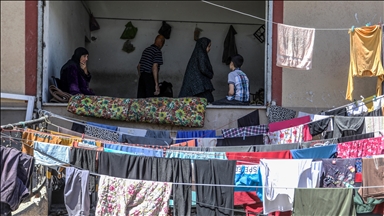For hepatitis patients, COVID-19 a chance to be understood
Alienation, furrowed eyebrows are last thing sick people need, a patient's reminder on World Hepatitis Day

ANKARA
Isolation, anxiety, stigma -- these words, today, are intrinsically linked with the COVID-19 pandemic, offering a glimpse into the plight of most of the nearly 16.5 million patients of the viral disease that has now claimed almost 655,000 lives across the globe.
However, there are millions more for whom these feelings have been a reality long before the world had even heard of COVID-19.
July 28, marked globally as World Hepatitis Day, is a day dedicated to them and their fight -- a fight that has been raging for over five decades now.
Given the gravity of the COVID-19 crisis, it is easy to forget that this is not the first viral disease to wreak havoc on the world.
In fact, viral hepatitis has impacted an estimated 325 million people and continues to claim hundreds of thousands of lives worldwide every year, according to the World Health Organization (WHO).
Its survivors hope that the COVID-19 outbreak can somehow help increase people’s understanding of viral diseases and how they radically change the sufferers’ lives.
A Turkish man diagnosed with hepatitis C believes it can prove to be an opportunity for people to understand how isolated and desperate patients of infectious diseases feel, and develop empathy towards them.
“My family turned away from me when they learned I had hepatitis C. I found myself all alone,” the man, who asked not to be named, told Anadolu Agency.
“They would physically distance themselves whenever I would sneeze or cough, although it is scientifically proven that the disease cannot be transmitted that way.”
He said the need for social distancing brought about by the coronavirus pandemic should make people realize how tough life can be for hepatitis patients, who are forced into isolation out of fear of being labeled or picked on.
“Given the fact that all human beings are vulnerable to the coronavirus disease, and how drastically it has changed our way of life, I believe that people should now better understand the predicament of people living with other viral diseases, such as the one I have,” said the man, who is a journalist and editor by profession.
“People need to understand that infections are not a matter of choice. Anyone can contract hepatitis or this coronavirus and they might find themselves in need of support and someone to open to their heart to.
“I just want people to understand that sick people require empathy and help. Alienation and furrowed eyebrows are the last thing they need.”
What is hepatitis?
Viral hepatitis is a group of infectious diseases known as hepatitis A, B, C, D, and E.
While they all cause liver disease, they differ in important ways including modes of transmission, severity, geographical distribution and prevention methods, according to WHO.
Types B and C lead to chronic disease and are the most common cause of liver cirrhosis, cancer, and viral hepatitis-related deaths.
Hepatitis can be caused by food or water, contaminated blood transfusion, exposure to contaminated medical equipment, and sexual contact among other reasons.
Among the most common symptoms of hepatitis are yellowing of the skin and eyes, dark urine, nausea, vomiting, and abdominal pain.
One of the main problems with this blood-borne virus is that a majority of the patients are unaware of their health condition, making them asymptomatic, meaning they might infect others unintentionally.
The theme for World Hepatitis Day 2020 is “Hepatitis-free future,” with a particular focus on preventing hepatitis B among mothers and newborn babies.
Anadolu Agency website contains only a portion of the news stories offered to subscribers in the AA News Broadcasting System (HAS), and in summarized form. Please contact us for subscription options.


